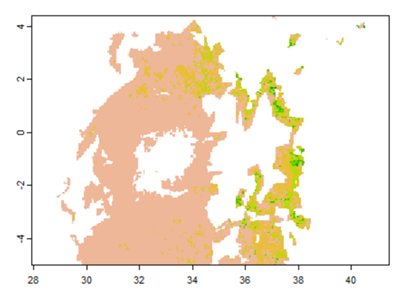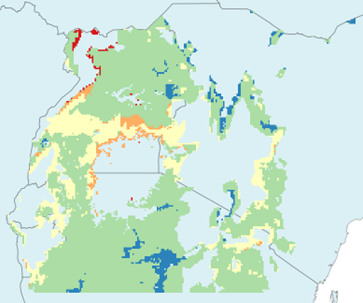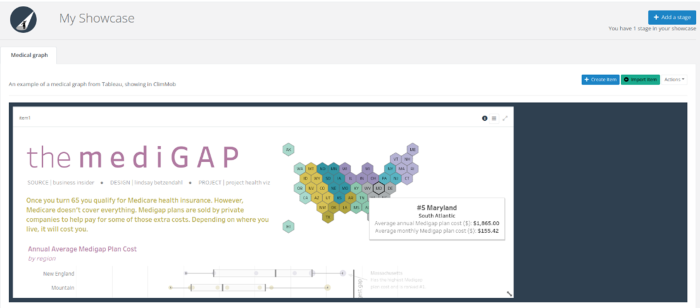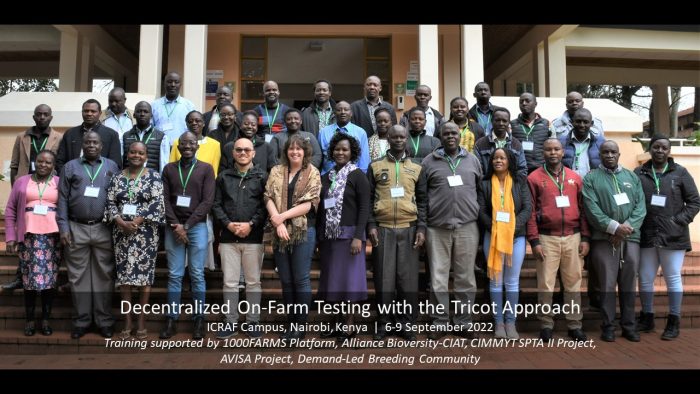14 November 2022
Standard Operating Procedures: Completed!
By the hand of Rhys Manners and his team, the data collection activity has completed the protocols for data collection for 8 crops (beans, cassava, cowpea, groundnut, maize, millet, potato and sorghum) which were validated by crop-specific teams. These protocols will now be included into ClimMob, allowing the opportunity of collecting standardized data on these crops in all new projects. To complement these data collection protocols, we’ve also finalized the protocols for volumetric yield estimates for the grain crops (beans, cowpea, groundnut, maize, millet and sorghum) which were also validated by relevant crop experts. Similarly, these will also be included in ClimMob to standardize the approach for collecting these data. The protocols for cassava and potato are still being developed in collaboration with IITA and CIP staff.
An artist has been engaged to generate artwork for 6 key traits (qualitative yield, maturity, germination, taste, marketability, and overall preference) that will be collected as part of the standardized protocols. It is expected that the visualization of the traits will support farmers in their understanding of what they are looking when providing their judgement on ‘best’ and ‘worst’.
Finally, the data collection activity has developed a protocol for cost-benefit estimates for all tricot trials. Thus allowing project managers to estimate the relative costs of tricot trials, versus other on-farm trial methods.
Meet Jin-Jung Li

Yin-Jung, a Taiwanese national, is currently doing a MSc in Plant Science with a specialization in Breeding and Genetics.
Under the supervision of Joost van Heerwaarden, variety performance analysis activity lead, and in close collaboration with Hugo Dorado and Dean Muungani, Yin-Jung has been studying the internal heterogeneity of CIMMYT and IITA’s maize target environments in terms of associated climatic, soil and weather data, as part of her thesis in Plant Production Systems. She has also provided proof of concept of exploring potential GxE using the spatial crop modelling framework.


ClimMob: More than 60 issues solved and new features added
For the past few months, the team led by Carlos Quiros has done an amazing job at listening to users’ feedback and suggestions and upgrading ClimMob to a more functional system. A total of 61 issues were identified and fixed. To name a few:
- Users can access FreshDesk, a helpdesk support software, directly from ClimMob to request technical support
- Users can access the Community Site directly from ClimMobCollaborators can now easily leave a project collaboration
- The form design has been completely revised
- The option to add new questions when preparing a form has been improved
- A new trait option “Not observed” has been added
- The project progress now shows more information
- All underlying libraries were updated to improve security
- The combination screen when creating packages was removed to avoid confusion
- A technology can be selected as reference when producing a report
- Field agents can now indicate their telephone and email, making integration with value added services like payments possible.
ClimMob is also introducing the following features:
- A support system powered by ZenDesk, a customer service software, that offers complete integration with ClimMob. For example, user can login to ZenDesk using ClimMob and the new OAuth2 plugin.
- Data collection using the Browser. This offers the possibility of collecting data using iOS (iPhones) or by users calling the farmer and entering the information in their computers. This feature is powered by Enketo and web browser integration of ODK and a plugin to integrate ClimMob with Enketo.
- Abilityt to upload data from Excel. This helps data collection where there is very limited internet and it is not possible to use ODK Collect or Enketo.
The team will now focus on developing a compensation, points based system for field agents. The user will be able to create projects and mark if they will compensate the field agents. If the project uses the compensation system, the interface will allow the user to select a field coordinator who will oversee the evaluation of the performance of field agents and manage the compensation.
Additionally, it will soon be possible to generate Data Collection Cards. By using the resources in the ClimMob Wiki (for example https://climmob.net/blog/wiki/cassava-graphic-resources/) we are able to create an automatic way for generating Data Collection Cards that the producers can understand and use to track their trials. We will generate a Word document with cards for each trait selected in ClimMob.
Finally, in the coming months, it should be possible to integrate graphs within ClimMob. The team is borrowing the ShowCase technology from FormShare and integrating it into ClimMob so that users can link graphs from external sources using the ClimMob data. For example, a graph made in Tableau with ClimMob data can be embedded into ClimMob.

1000FARMS course delivered to 100 participants
From July to September 2022, the 1000FARMS course activity focused on capacity building. The “Decentralized on-farm testing with the tricot approach” course was delivered to 100 professionals (67 men and 33 women) over the course of three on-site sessions, implemented in Uganda (collaboration with NEXTGEN Cassava), Tanzania (collaboration with AVISA) and Kenya (collaboration with SPTA).
The course offers knowledge on key concepts to design, implement, and manage decentralized experimental trials in agriculture and to develop agricultural products with wider applicability in the target environment. The course focuses especially on testing breeding products, but also has much relevance for other technological options. Additionally, it offers expert knowledge on statistical methods and tools for data-driven experimental agriculture for real world applications.
Professionals that received the training are now able to implement decentralized trials with the tricot approach, use key digital tools for experimental agriculture (ODK, ClimMob), use statistical models to analyze the decentralized trial data, and interpret the results from decentralized experiments and apply relevant knowledge to real-life situations.



